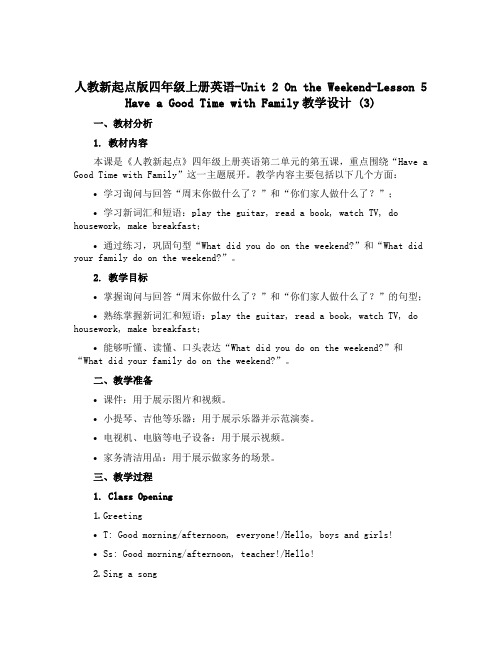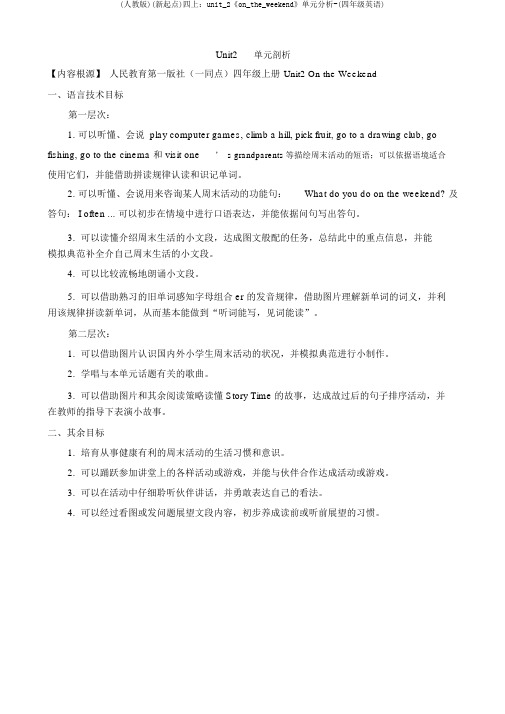英语知识点人教版(新起点)英语四上Unit 2《On the Weekend》(Let’s Check)教学设计-总结
小学英语人教版新起点(一起)四年级上册Unit 2 On the Weekend

小学英语人教版新起点(一起) 四年级上册
市实小 清风制作
1. What do you do on the weekend?
周末,你干什么?
I often go fishing.
我常常去钓鱼。
2. often, always 的区别。
often adv. 经常,常常。 always adv. 总是,永远。 两者都表示频率,但always 表示的频率更高。
ห้องสมุดไป่ตู้ We always visit my grandparents on the weekend.
We always go to a drawing club on the weekend.
回家把今天学的对话 读给爸爸妈妈听。
1) He always get up early. 他总是早早起床。
(带有一点夸奖的意思。)
2) She often go to the cinema.
她经常去看电影。
We often pick fruits on the weekend.
I often climb a hill on the weekend.
I often play computer games on the weekend.
I always go fishing with my family.
I always go to the cinema with my parents on the weekend.
We often go fishing on the weekend.
人教新起点版四年级上册英语-Unit 2 On the Weekend-Lesson 5 Have

人教新起点版四年级上册英语-Unit 2 On the Weekend-Lesson 5 Have a Good Time with Family教学设计 (3)一、教材分析1. 教材内容本课是《人教新起点》四年级上册英语第二单元的第五课,重点围绕“Have a Good Time with Family”这一主题展开。
教学内容主要包括以下几个方面:•学习询问与回答“周末你做什么了?”和“你们家人做什么了?”;•学习新词汇和短语:play the guitar, read a book, watch TV, do housework, make breakfast;•通过练习,巩固句型“What did you do on the weekend?”和“What did your family do on the weekend?”。
2. 教学目标•掌握询问与回答“周末你做什么了?”和“你们家人做什么了?”的句型;•熟练掌握新词汇和短语:play the guitar, read a book, watch TV, do housework, make breakfast;•能够听懂、读懂、口头表达“What did you do on the weekend?”和“What did your family do on the weekend?”。
二、教学准备•课件:用于展示图片和视频。
•小提琴、吉他等乐器:用于展示乐器并示范演奏。
•电视机、电脑等电子设备:用于展示视频。
•家务清洁用品:用于展示做家务的场景。
三、教学过程1. Class Opening1.Greeting•T: Good morning/afternoon, everyone!/Hello, boys and girls!•Ss: Good morning/afternoon, teacher!/Hello!2.Sing a song•T: Let’s sing a song “Weekend” together.2. Review and Presentation•T: Last time we learned “On the Weekend”. Can you still remember the sentence pattern?•Ss: Yes. What did you do on the weekend?•T: Good! Today we are going to learn a song called “Have a Good Time”. Let’s watch and listen to the video first.3. Practice1.T: Now, please open your textbook and turn to page 23. Let’s read the dialogue on the page together.2.T: Alice asks Ben“What did you do on the weekend?”,what can you answer?S1: I read a book on the weekend.S2: I watched TV on the weekend.S3: I played the guitar on the weekend.3.T: What did Ben ask Alice?S1: What did your family do on the weekend?S2: Did you do your homework on the weekend?S3: Did you go to the park on the weekend?4.T: OK, let’s do a role play.–S1: What did you do on the weekend?–S2: I played the guitar on the weekend.–S1: That sounds interesting. Can you show us how to play it?–S2: Sure.–(S2 takes out the guitar and plays a simple song.)5.T: Good job! Your guitar playing is really nice. Now let’s do a survey. Walk around the classroom and ask your classmates“what did you do on the weekend?” Write down their answers.6.T: Now, let’s work in pairs. Ask your partner“What did your family do on the weekend?” and write down their answers.4. Production1.T: Let’s do a quiz. I will describe an activity, and you need to guess what it is.•The activity is about using a tool to clean the floor or the table. Answer: Do housework.•The activity is about using a stringed instrument to make music. Answer: Play the guitar.•The activity is about looking at pictures on the screen and following the story. Answer: Watch TV.•The activity is about using your eyes and mind to read a story or a book. Answer: Read a book.•The activity is about making food and eating it, usually in the morning. Answer: Make breakfast.2.T: OK, let’s sing the song “Have a Good Time” together and show your actions.5. Class Closing1.T: That’s all for today. Do you have any questions or doubts in today’s lesson?2.T: Homework:•Interview your family members“What did they do on the weekend?” and write down their answers.•Practice the new words and the dialogue on the textbook.•Review the sentence pattern“What did you do on the weekend?”。
四年级英语上册(新起点)Unit 2必备知识点

四年级英语上册(新起点)Unit 2 on the Weekend必备知识点四年级英语上册(新起点)Unit 2 On the Weekend的必备知识点包括词汇、句型、语法以及日常交际用语。
以下是对这些知识点的详细归纳:一、词汇1. 周末活动词汇:visit one's grandparents(看望外/祖父母)go to a drawing club(去绘画俱乐部)climb a hill(爬山)pick fruit(采摘水果)play computer games(玩电脑游戏)go fishing(钓鱼)go to the cinema(看电影)on the weekend(在周末)2. 其他相关词汇:always(总是)often(经常)sometimes(有时)fun(有趣的)with my parents(和我父母一起)in the sea(在海里)on the beach(在海滩上)二、句型1. 询问对方周末活动:What do you do on the weekend?I often go to a drawing club.2. 询问并回答是否经常做某事:Do you often go to the cinema on the weekend?Yes, I do. / No, I don't.3. 描述自己的周末活动:I often climb hills with my parents.I sometimes pick fruit in the garden.三、语法1. 一般现在时:用于描述经常发生的动作或存在的状态,常与always、often、sometimes等频度副词连用。
例如:I often play computer games on the weekend.2. 动词原形及第三人称单数:当主语为第一人称或第二人称以及复数时,动词使用原形。
当主语为第三人称单数时,动词需要变为第三人称单数形式,通常在动词后加-s或-es。
人教新起点版小学英语四年级上册单词默写

job[dʒɒb]
sick[sɪk]
people[''piːp(ə)l]
teach[tiːtʃ]
just[dʒʌst]
myself[maɪ''self]
sound[saʊnd]
Monday[ˈmʌndeɪ; ˈmʌndi]
Tuesday[''tjuːzdeɪ; -dɪ]
Wednesday[ˈwenzdɪ]
basketball[''bɑːskɪtbɔːl]
roller skating[ˈrəulə ˈskeɪtɪŋ]
jumping rope
ping-pong[pɪŋ pɔːŋ]
What about...?[wɑt ə''baʊt]
interesting[ˈɪntrəstɪŋ]
often[''ɒf(tə)n]
enjoy[ɪnˈdʒɔɪ]
park[pɑːk]
apple[''æp(ə)l]
Unit 4 Asking for Help
pen[pen]
knife[naɪf]
eraser[ɪ''reɪzə]
crayon[ˈkreɪən]
scissors[''sɪzəz]
glue stick[ɡlu:stik]
paper[''peɪpə]
use[juːz]
please[pliːz]
find[faɪnd]
Information Centre[ˌɪnfəˈmeiʃən ˈsentə]
Excuse
phone[fəʊn]
人教新起点版四年级上册英语-Unit 2 On the Weekend-Lesson 5 Have

人教新起点版四年级上册英语-Unit 2 On the Weekend-Lesson 5 Have a Good Time with Family教学设计 (3)
一、教学内容
本节课的教学目标:学生能够熟练运用本课所学句型,表达周末和家人度过美好时光的感受和建议。
教学重点:本课所学句型。
教学难点:熟练运用所学句型,表达自己的想法和建议。
二、教学准备
1.教师准备:课件、幻灯片、音频文件等。
2.学生准备:本课所学单词和句型。
三、教学过程
1. 热身与复习
教师请学生回忆上节课学习内容,使用本课所学的句型进行复述。
并通过调查问卷等方式调查学生上个周末的活动和感受,并将结果分享给大家。
2. 新课讲解
1.教师通过幻灯片或课件展示本节课的学习内容,并做简要讲解。
2.教师逐句解释和讲解所学句型的用法和意义,并通过实例进行练习和巩固。
3.教师播放本节课所学句型的音频,让学生听一遍,然后跟读练习。
3. 练习与巩固
1.教师设计各种情境,让学生运用所学句型互相交流,例如:询问和回答上个周末的活动,向家人或同学建议下一个周末的活动等。
2.教师安排小组活动,让学生互相分享自己的周末活动和感受,并互相提出建议和想法。
4. 课堂回顾
教师让学生回顾本节课所学内容,巩固和加深学习效果。
四、教学总结
本节课通过讲解和练习,让学生能够熟练运用所学句型,表达自己的想法和建议。
通过小组活动和情境练习等方式,加深了学生对所学内容的理解和掌握。
同时,通过回顾和总结,让学生在课后能够更好地巩固所学内容,提高知识掌握水平。
(人教版)(新起点)四上:unit_2《on_the_weekend》单元分析-(四年级英语)

(人教版)(新起点)四上:unit_2《on_the_weekend》单元分析-(四年级英语)Unit2单元剖析【内容根源】人民教育第一版社(一同点)四年级上册Unit2 On the Weekend一、语言技术目标第一层次:1. 可以听懂、会说 play computer games, climb a hill, pick fruit, go to a drawing club, go fishing, go to the cinema 和 visit one’ s grandparents等描绘周末活动的短语;可以依据语境适合使用它们,并能借助拼读规律认读和识记单词。
2. 可以听懂、会说用来咨询某人周末活动的功能句:What do you do on the weekend? 及答句: I often ... 可以初步在情境中进行口语表达,并能依据问句写出答句。
3.可以读懂介绍周末生活的小文段,达成图文般配的任务,总结此中的重点信息,并能模拟典范补全介自己周末生活的小文段。
4.可以比较流畅地朗诵小文段。
5.可以借助熟习的旧单词感知字母组合 er 的发音规律,借助图片理解新单词的词义,并利用该规律拼读新单词,从而基本能做到“听词能写,见词能读”。
第二层次:1.可以借助图片认识国内外小学生周末活动的状况,并模拟典范进行小制作。
2.学唱与本单元话题有关的歌曲。
3.可以借助图片和其余阅读策略读懂 Story Time 的故事,达成故过后的句子排序活动,并在教师的指导下表演小故事。
二、其余目标1.培育从事健康有利的周末活动的生活习惯和意识。
2.可以踊跃参加讲堂上的各样活动或游戏,并能与伙伴合作达成活动或游戏。
3.可以在活动中仔细聆听伙伴讲话,并勇敢表达自己的看法。
4.可以经过看图或发问题展望文段内容,初步养成读前或听前展望的习惯。
小学英语人教版新起点(一起)四年级上册《Unit2 On the Weekend》资料字词解释及例……

小学英语人教版新起点(一起)四年级上册《on the weekend》资料字词理解及例句was(英文单词is,am的过去式)本词条缺少信息栏、名片图,补充相关内容使词条更完整,还能快速升级,赶紧来编辑吧!was是英文单词am(vi.是; v.aux.; abbr.)的第三人称单数过去式,同时也是多个英文词组的简称。
was[英][wɒz [美][wʌz, wɑz,wəzv.用来表示某人或某物即主语本身,用来表示某人或某物属于某一群体或有某种性质(is,am的过去式 );在,存在;不受干扰swam[英][swæm][美][swæm]v.游泳( swim的过去式 ); 眩晕; 浸; 泡;例句:1.He swam until another boat picked him up and saved his life.他一直游着,知道别的船只把他救起来才捡回一条命。
walk[英][wɔ:k][美][wɔk]vt.& vi.走; 步行; 散步;n.步行; 步态; 人行道; 步行的路径;vi.行走; 陪伴…走; 徒步旅行; 不翼而飞;vt.牵着(动物)走,遛,赶着…走;第三人称单数:walks过去分词:walked复数:walks现在进行时:walking过去式:walked易混淆单词:WALKWalk例句:1.I could walk further and faster.我可以走得更快更远。
studied[英][ˈstʌdid][美][ˈstʌdid]adj.有计划的; 故意的; 深思熟虑的; 精通的;v.学习,研究( study的过去式和过去分词 ); 想出; 详细地检查; 背诵(台词等);例句:1.Have you studied any other languages in school?你在学校有没有学习过其他语言?returned[英][rɪ'tɜ:nd][美][rɪ'tɜ:nd]adj.被送回的,归来的;v.恢复; 归还; 返回,回来( return的过去式和过去分词 ); 还;例句:1.When faraday returned to the island.当faraday回到岛上的时候。
小学英语人教版新起点(一起)四年级上册《Unit2 On the Weekend》资料一般过去时字……

小学英语人教版新起点(一起)四年级上册《on the weekend》资料一般过去时字母军团表示过去某个时间里发生的动作或状态。
一般过去式的动词通常用动词的过去式形式来表示,而动词的过去式是在动词原形的基础上变化的。
动词的过去式可分为规则动词和不规则动词。
【过去式】⒈过去发生的而已经结束的动作需要用一般过去式来表示⒉表示过去某个时间里发生的动作或状态。
⒊过去习惯性、经常性的动作、行为;过去主语所具备的能力和性格。
【过去时态】表示行为、动作和状态在各种时间条件下的动词形式。
【过去时态结构】是指过去时态下的动词形式的语法构成。
如:work-workedlisten-listened 一般的就是直接加ed,特殊的有一些变化。
A:What did you do last weekend? 你上周末做了什么?B:I played football.我踢了足球。
A:Did you read books?你看了书吗?B:Yes,I did.是的,我看了。
A:What did you do last week?你上个星期做了什么?B:I studied English.我学习了英语。
A:Did you read books?你看了书吗?B:Yes,I did.是的,我看了。
毒药合成:表示一般过去式的动词通常用动词的过去式形式来表示,规则动词的过去式变化如下:⑴一般情况下,动词词尾加 ed ,如:work—worked; play—played;want— wanted; act—acted⑵以不发音的 e 结尾动词,动词词尾加 d,如:live—lived; move—moved; decide—decided; decline—declined; hope—hoped;⑶以辅音字母+ y结尾的动词,把y变为i 再加ed,如:studied tried copied justified cried carried embodied emptied⑷以一个辅音字母结尾的重读闭音节动词,双写词尾辅音字母,再加 ed,如:stopped begged fretted dragged dropped planned dotted dripped⑸以ic结尾的动词,要把ic变成ick再加ed,如picnic→picnicked,traffic→trafficked⑹注:不规则动词的过去式变化规律性不强,须多加记忆。
- 1、下载文档前请自行甄别文档内容的完整性,平台不提供额外的编辑、内容补充、找答案等附加服务。
- 2、"仅部分预览"的文档,不可在线预览部分如存在完整性等问题,可反馈申请退款(可完整预览的文档不适用该条件!)。
- 3、如文档侵犯您的权益,请联系客服反馈,我们会尽快为您处理(人工客服工作时间:9:00-18:30)。
Unit2 Let’s Check教学设计
【内容来源】人民教育出版社(一起点)四年级上册Unit2 On the Weekend
【课时】Let’s Check
一、教学目标
1. 能够听懂、会说本单元的重点词汇和功能句。
2. 能够认读本单元的重点词汇和功能句,并会默写其中部分单词和功能句。
3. 能够初步在语境中运用重点词汇和功能句。
二、教学建议
A. Look, listen and match.
1. 热身活动
学生跟读Lesson 1 A项的小文段。
教师也可以出示本单元主情境图,请学生表演自编的对话。
2. 看图准备
教师提问:Who are they? What do they do on the weekend? 请学生看图10秒钟。
带领学生大声朗读A项题目要求:Look, listen and match. 帮助学生明确任务。
3. 听音选择
学生听录音,选择相应的图片连线。
4. 核对答案
教师再次播放录音,请学生尽量跟读句子,核对答案。
学生进行自我评价,如:选对一幅图得到一颗星。
请学生任选A项的一个人物,根据图片内容以第一人称扮演该人物,介绍周
末经常从事的活动。
如:I’m Miss Wu. I often climb a hill on Saturday. The air is fresh there on the hill. I often go to a dancing club on Sunday. It’s fun.
学生互相评价,如:根据说的内容与流利程度给出三至五颗星。
B. Read, circle and write.
1. 阅读信件
请学生浏览信件,回答问题:Who wrote this letter? What is the letter about?
2. 明确任务
教师提问:What is your task? 请学生朗读B项题目要求:Read, circle and write. 教师根据学生用书中的范例,讲解需要圈画周末从事的活动。
3. 完成圈画任务
学生自行阅读,完成圈画任务。
4. 完成回信
结合Tom信件的内容,教师可以先和学生进行口头交流,如:Where are you from? How old are you? What do you do on the weekend? What about your father and mother?
之后请学生浏览回信的框架结构,按此框架结构小组内口头说一说,最后再动笔写。
引导学生根据学生用书第76页的描述结合自己的实际情况,进行自评。
1. 如果学生能用英语说出一项周末活动的名称,则补全一个笑脸;能认读一个词语,则给一颗星;若会默写一个词语,还可以再给一颗星。
2. 如果学生能用I like ... I often ... My father/mother likes ... He/She often ... 介绍自己及家人的周末活动,说出一个句子则给一颗星。
根据学生说出的正确句子数量统计星星数量。
鼓励学生多说。
三、备选活动
【板书设计】。
